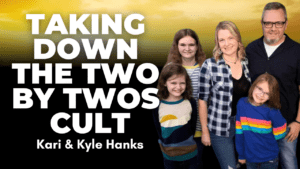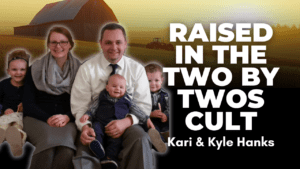Today we finally release Part 2 of our series on New Order Mormonism. New Order Mormons’ web site can be found here. According to their web site, “New Order Mormons are those who no longer believe some (or much) of the dogma or doctrines of the LDS church, but who want to maintain membership for cultural and social reasons.” In part 2 of this series, Ann discusses New Order Mormonism in detail, and talks about the “Seasons” within her life as a New Order Mormon.




24 Responses
Nice interview. I liked how she talked about the fact that the new order lifestyle simply cannot be kept up for ever. Things have to come to a head. I never looked at that side of being a NOM. I can also say that I understand what she was saying and likely I have just passed that point.
A bit over a month ago I was going to church with my wife as I do about once a month and it did not end as normal. normally I make it through as I like the time with her. As church is 9-12 and dinner afterwords I pretty much lose my wife for half of the two days I have with her. So when I really want time with her I go.
That Sunday as I was sitting in EQ listening to the lesson we all were entertained with the children in the next section singing. The problem was that the teachers were using a rote(?) system to teach them so they repeated over and over the same line.
Follow the Prrophet.
Follow the Prrophet.
Follow the Prrophet.
Follow the Prrophet.
Over and over till I had to get my wife and leave. That religious like chanting was to much for me that day. Been over a month since I have been back. Oddly enough even when I miss my wife I cannot bring myself to go back right now. I keep hearing those kids repeating that over and over.
Thanks John and Ann for covering the “Seasons” of NOMhood. As I have seen myself, there are tides of activity and less activity. I have been on a more active mode recently, but suspect I will have to pull back for awhile to maintain my sanity. I can sit through one of our GD teacher’s lessons, but the other, bless her heart, is so by the manual, she can’t seem to think for herself. I cannot tolerate that any more. For me the optimum schedule so far has been the one-hour block, plus skipping the first Sunday so I don’t have to listen to the F&T meeting.
As to Gunner’s comments, one of our long time NOMs, kitestring, has been a NOM for 20 years or more. He is well adjusted, varying his activity level over time to fit with the rest of his life. NOMhood can be maintained by some people, sanely, over a long period of time. It is certainly not for everyone, and probably not for most, but it does work for some.
Why not stay active and be a pillar of sanity? Why let other people and their nuttiness get to you? Granted, most members of the church are nuts, but so is most of humanity.
“Why are you beating your head against the wall?”
“Because it feels so good when I stop.”
Correlated lessons are hell. The platitudes drive me insane. For several months, I spent most of the time I was in church wishing I were dead.
I can’t stay and be a pillar of sanity without being a lot more sane than I am.
A large part of withdrawing is taking care of our own mental health.
Yes, part of mental health is learning to take of yourself, removing yourself from situations that make you unhappy.
Another part is learning to accept and love people even though they can be lame; in essense, one can choose to be unaffected when someone or something sucks.
I have very little quarrel with the Saints. They are some of the best people I know.
It’s not about the people, most of the time. It’s the institution. The LDS church is NOT composed of the people who attend. It has a life and personality of its own.
I disagree. I think the church is made up of its people. I see past the trite lessons and repetitive repetitive repetivie correlated lessons and think of the people who wrote them: hungry souls like mine doing their damnedest.
But whether or not the church is made up by its people, you still can choose whether or not to be affected by its personality.
So church is boring (yes it is) . . . it’s not made to entertain.
So church leaders repeat themselves and really dumb things down (yes they do) . . . who knows how I’d be running it?
So church history can be bizarre (amen) . . . it doesn’t matter if this church is God’s.
Ahh, jordananmeg, if it works for you to attend, if you find meaning and value in doing so, then keep it up. Ann is quite clear that it doesn’t work for her. Allow her the space to figure out what works for her and to order her life accordingly.
As I can see it, you can only be a pillar of sanity if sanity is desired. Where sanity is mocked you cannot be a pillar.
Can’t agree with you more, Jeffret. People have to do what works for them and deserve their space.
And I know church attendance isn’t a prerequisite for salvation nor a cure all for life’s problems.
I am only exploring various reasons for disliking church. Again, you can choose your reaction when someone mocks your sanity.
Someone mocks me . . . how do I choose to see that person, myself? How will I react?
One doesn’t have to react by pulling away. I don’t blame people for doing so, but pulling away is only one choice among many.
Been there, done that. It worked for many years for me. For the most part it doesn’t work any more.
I fully agree that people can choose to pull away or they can choose to stay. That’s pretty much the essence of NOM. Some stay engaged. Some do so grudgingly. Some find genuine satisfaction in staying engaged.
Why have you pulled away?
It’s a long story. I’ve never come up with a short version that is both enlightening and accurate.
Here’s one inaccurate attempt:
Because of various callings it had been a long (long) time since I had attended church adult classes. For other reasons, my sacrament meeting attendance had dropped off, mainly in the sense of getting there late. When callings changed, I found myself back in classes and discovered that I could find very little connection with what went on there. I allowed myself to consider alternatives and decided I was happier and more spiritually enriched disengaging from the LDS church.
Understood. I know how that can be.
What made you feel disconnected from those classes?
Umm. They cared about things that were meaningless to me. They didn’t care about things that were meaningful to me. They looked at things in completely different ways from how I did.
I’m well familiar with what Mormons believe and how they think, but when I was thrust back in that again I found myself repeatedly surprised at what they believed. Within an institutional context I couldn’t figure out how to build bridges from where I am. On a personal level, I’m fine with building and/or maintaining bridges to people I know. Ones that come at me from purely an institutional reason (HT for example) I still don’t know how to build bridges with. They’re coming not because of me but because of the institution.
Yes, hometeaching can have that vibe.
What do you think changed in you while you were away from those adult classes? Was it increased maturity, disillusionment, testimony rearranging?
What are some of the things you cared about that the church didn’t?
(And hey, if these questions bug you, by all means, ignore me. Thanks for taking us this far.)
jordanandmeg, you ask what changed in me. It might be simpler to consider what didn’t change. For the most part I still adhere to the LDS commandments, except those having to do with the support and allegiance to the tribe or institution. My beliefs and interests changed substantially. In other words, I’m primarily still orthoprax as it regards my personal life, but substantially heterodox. If I had only changed half as much I may have still been able to find room in the LDS church.
Ann, in her interview, covered some of the things that I care about. There is the idea of treating all people fairly and decently, whether or not they are part of our tribe, believe the way I do, or love differently than I do. There is the idea of treating men and women fairly and equally, not subjugating women (or men for that matter). I care about encountering new ideas and new ways of considering things, not binding ourselves by what has been by some previous (or current) authority. I care about letting people grow and develop according to their own needs and not to satisfy the demands of the instititution. That’s a start.
Interesting interview – but I thought Sister Ann came across as self-absorbed and a little nutty.
She begins by telling us that it was prayer and personal revelation that provided her initial testimony and conversion. But – the straw that broke the camel’s back was that someone else dared to receive a little personal revelation. Okay for Nephi, Lehi and JS to be enlightened as to one of the world’s most archetypal revelations – but hey – Joseph Sr. is one too many! How dare he! That’s just a little toooo convenient! I guess Ann’s tolerant views are not broad enough to include everyone at the supper.
John mentions “buffet Mormonism” and Ann responds with glib chuckling and a few snarky anecdotes, but it seems to me that New Order Mormonism – by definition – is quintessential buffet Mormonism.
The whole thing came across as “Damn! The Mormon church has a few warts and nobody told me! And on top of that – God didn’t answer my prayer even when I insisted he did!! I’m taking my toys and leaving . . . sort of.”
At least that’s how I read it. Sorry.
Tony
Aren’t we all a little self absorbed and nutty? I am.
I think one of the things I like most about these stories is the fact that it doesn’t really have to add up to a perfect equation, just like believing in the church relies heavily on something that is in a sense unexplainable. I decided I didn’t want to be Mormon after watching the movie American History X. That makes no sense at all and the process that went through my brain is too long and complicated and convoluted to ever explain but it was real even if the story doesn’t make perfect sense.
Not having a righteous prayer answered is rough. Is it reason enough to leave the church? Maybe not by itself, but that Camel might have more straw on its back than we can ever see.
I doubt there is one person who comes to these stories without a pretty intense amount of their own baggage. I guess I am just saying I think it is dangerous to start qualifying what are good/bad reasons to stay in/get out of the church.
Also the idea of labels is interesting. Post Mormon, Ex Mormon, inactive, true blue, semi active, anti. How can you measure a person’s faithfulness? Even their own self-prescribed label can’t totally be trusted.
The web site Anne runs is a Mormon web site. She probably spends more of her day thinking about Mormon doctrine than most people in my home ward. It’s not always negative either. For those who spend a significant time in the church it is inevitable that the church will ALWAYS play a role in our lives. That used to piss me off, but now I am grateful to have a faithful background.
Who knows how any of us will feel tomorrow?
Isn’t that kinda harsh, Tony? The premise of Mormon Stories is to have people talk about themselves. How does a person spend an hour or two talking about herself, and not sound self-absorbed?
Deep down, we’re all eating at a buffet when it comes to religion. Nobody does it all, all of the time. We focus on the parts that meet our needs at the moment, and our needs change periodically.
Yeah, that’s me. Selfish, self-absorbed and shallow. I’m fat, too. And I can’t sing worth a damn. I’m a terrible listener and have trouble focusing on one (look! a bird!) thing at at time. I’m not a very good mother, I’m a spendthrift, and my house is a mess.
Nice to meet you.
Hey, come on, Ann. You know it’s not true and we know it’s not true.
It was a very good interview. I was impressed with how well you could remember various thoughts and bring them forward.
Great show. I totally respect Ann but I just don’t get how you can just participate in a group that constantly pushes its members to “know the church is true,” and unlike metaphorical churches like the Episcopal Church and the United Church of Christ (to name just a couple) Mormonism is one of those LITERALISTIC religions. It’s like joining a group that demands that there really were three pigs and a wolf that tried to eat them but you see it as a metaphor for sticking together and the importance of friends and family. What do you tell your kids when you say its mere poetry but your group says it’s real history?
You’ve hit on an important point in your last sentence there. My son who was a freshman in college made the decision to quit going to church, and when we talked about it, he said that as long as he thought the church was the way I portrayed it for him, he could believe it was true– but that in his experience it was not at all that way. He wasn’t accusing me of lying, but of seeing it through the warm fuzzy experiences of my Utah childhood. He grew up in a church that was much more right-wing, much less tolerant of differences. Huge emphasis for him on appearances, literalism and obedience. While those certainly were all there when I was growing up, they were weren’t as strong then, and they were mitigated by the great sense of community, which he never felt here in Southern California (much more ward cliquishness here.)
Yes, the emphasis to always prove the church true puts an unwieldy burden on everyone. It’s more important to know what is good than to know what is true.
At the same time, no part of church doctrine has been PROVEN false. I hesitate to say something is bunk as much as I hesitate to say something is true.